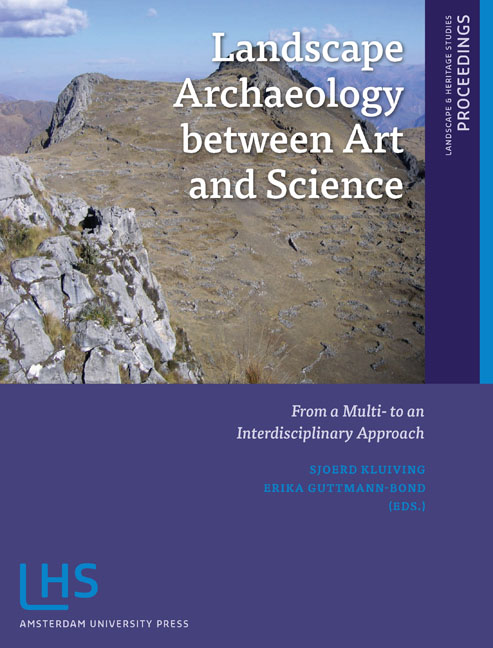Book contents
- Frontmatter
- Contents
- Preface
- Introduction: LAC2010: First International Landscape Archaeology Conference
- THEME 1 HOW DID LANDSCAPE CHANGE?
- THEME II IMPROVING TEMPORAL, CHRONOLOGICAL AND TRANSFORMATIONAL FRAMEWORKS
- THEME III LINKING LANDSCAPES OF LOWLANDS TO MOUNTAINOUS AREAS
- THEME IV APPLYING CONCEPTS OF SCALE
- THEME V NEW DIRECTIONS IN DIGITAL PROSPECTION AND MODELLING TECHNIQUES
- THEME VI HOW WILL LANDSCAPE ARCHAEOLOGY DEVELOP IN THE FUTURE?
- Miscellaneous Endmatter
6.5 - Landscape Studies: The Future of the Field
Published online by Cambridge University Press: 21 January 2021
- Frontmatter
- Contents
- Preface
- Introduction: LAC2010: First International Landscape Archaeology Conference
- THEME 1 HOW DID LANDSCAPE CHANGE?
- THEME II IMPROVING TEMPORAL, CHRONOLOGICAL AND TRANSFORMATIONAL FRAMEWORKS
- THEME III LINKING LANDSCAPES OF LOWLANDS TO MOUNTAINOUS AREAS
- THEME IV APPLYING CONCEPTS OF SCALE
- THEME V NEW DIRECTIONS IN DIGITAL PROSPECTION AND MODELLING TECHNIQUES
- THEME VI HOW WILL LANDSCAPE ARCHAEOLOGY DEVELOP IN THE FUTURE?
- Miscellaneous Endmatter
Summary
ABSTRACT
In this paper, I will go back to basics in landscape archaeology. How do we use the evidence of the landscape to find out about the past? I reflect on the distinctive nature of landscape studies as distinctive not as ‘art’ or as ‘science’, but as a field-based discipline, in which the [claim of an] apprehension and encounter with a reality ‘out there’ in the field is placed at centre stage.
Historically, field-based disciplines have a stress on what is claimed as ‘direct experience’, particularly in terms of their vernacular imagination – in other words, the colloquial language and everyday values deployed in field practice. Field-based disciplines rest, in part, on the urge to go out and see for oneself, rather than rely on others’ reports.
‘Direct experience’, however, is a problematic concept. Most crucially, the claims of any discipline to be ‘scientific’ must rest not on the amount of direct experience gathered, but rather in the way that experience is brought to bear on concepts and theories about it, and vice versa. If landscape archaeology is to be rigorous and scientific, it must abandon rhetorical appeals to an untheorised category of direct experience and reflect more seriously on the relation of evidence to inference.
INTRODUCTION
This paper has as its aim the setting out of issues of knowledge construction and knowledge evaluation in landscape archaeology. It forsakes some of the more detailed and advanced dicussions of the field (for which see Johnson 2007; David & Thomas 2008; Tilley 1994, 2004; Bender 1998; Thomas 1999; Ingold 2000; Bender et al. 2008; Smith 2003). Instead, it goes back to basics: asks how landscape archaeologists find out about the past, and in particular, how they make a judgment as to whether their interpretations are ‘good’ or ‘bad’, are or are not supported by evidence. My desire is to strengthen these methods of evaluation and to make landscape archaeology a more rigorous empirical science.
I want to be as clear and precise as possible in what follows. Landscape archaeology, for reasons we shall explore, is an area of research that is full of woolly thinking. The field has been beset by a lack of conceptual clarity.
- Type
- Chapter
- Information
- Landscape Archaeology between Art and ScienceFrom a Multi- to an Interdisciplinary Approach, pp. 515 - 526Publisher: Amsterdam University PressPrint publication year: 2012



